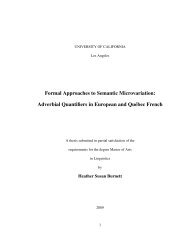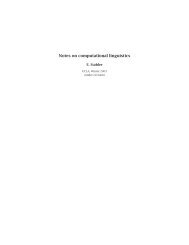Post Verbal Subjects and Agreement in Brazilian Portuguese
Post Verbal Subjects and Agreement in Brazilian Portuguese
Post Verbal Subjects and Agreement in Brazilian Portuguese
Create successful ePaper yourself
Turn your PDF publications into a flip-book with our unique Google optimized e-Paper software.
(94) Chegou as cartas.<br />
arrived.sg the letters<br />
‘The letters arrived.’<br />
pro<br />
TP<br />
T<br />
T'<br />
Chegar<br />
VP<br />
38<br />
as cartas<br />
A full analysis along these l<strong>in</strong>es would have to work out the details of verb<br />
rais<strong>in</strong>g above T, as well as the process of default agreement (which <strong>in</strong>creases the<br />
number of possible mechanisms of agreement <strong>in</strong> the grammar). However, the<br />
problem which <strong>in</strong>dicates that this analysis is probably not on the right track is that it<br />
assumes that the subject (<strong>and</strong> possibly, but not necessarily, the verb) occupy<br />
different positions <strong>in</strong> the cases <strong>in</strong> which there is agreement with the post-verbal<br />
subject <strong>and</strong> cases with third person s<strong>in</strong>gular agreement. However I have not found<br />
any empirical evidence that would support this. Consider for example the placement<br />
of adverbs with unaccusatives. Compare the two versions of VS unaccusatives <strong>and</strong><br />
the non-<strong>in</strong>verted case (where there is only one possibility of agreement):<br />
(95) a. (*rapido) chegou (rapido) as cartas (?rapido).<br />
quick arrived.sg quick the letters quick

















